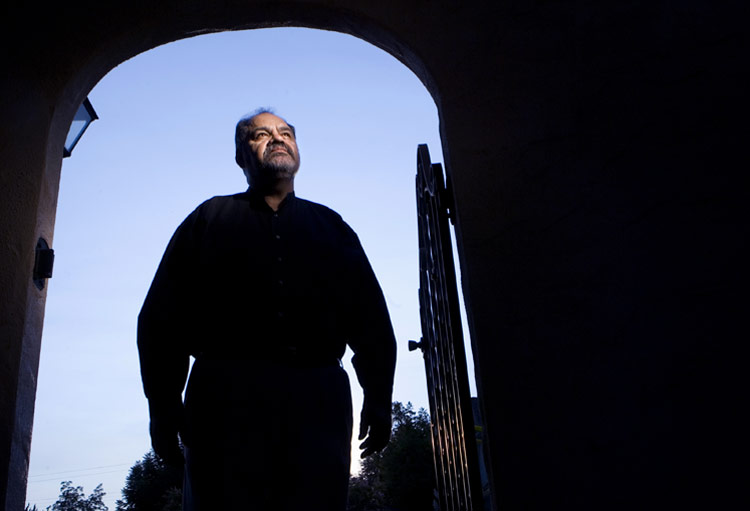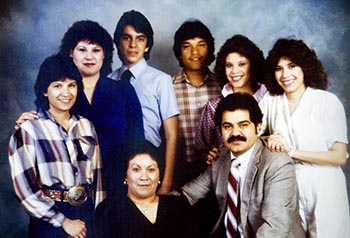







Crossing chapters
Jump to:Video

The death of Luis Lozano's sister in the crash ruined his parents, but he was determined not to make their mistakes.
 Watch video
Watch video
Related content

Crossing forums
 Forum at the Rocky Mountain News in Denver.
Forum at the Rocky Mountain News in Denver.
 Forum at the Union Colony Civic Center in Greeley.
Forum at the Union Colony Civic Center in Greeley.
Podcasts:
Acknowledgements
"The Crossing" could only be told with the help of many people:
- The more than 80 people touched by the tragedy of Dec. 14, 1961, who agreed to tell their stories.
- Bill and Mary Bohlender, who helped unearth numerous historic documents and provided numerous insights.
- Virginia Shelton and Mary Shelton Shafer, who provided numerous insights and access to attorney Jim Shelton's files.
- Keith Blue, who provided numerous insights.
- Peggy Ford and the staff at the City of Greeley Museums, Barbara Dey and the Hart Library staff at the Colorado History Museum and former Rocky librarian Carol Kasel, who all assisted with research.
Contact the series team
- Reporter: Kevin Vaughan
- Photographer: Chris Schneider
- Video: Tim Skillern & Laressa Bachelor
- Print designer: Armando Arrieta
- Web designer: Ken Harper
- Web producer: Forrest Stewart
- Web developer: Chris Nguyen
- Copy editor: Dianne Rose
- Photo editor: Dean Krakel
- Imager: Marie Griffin
- Interactive editor: Mike Noe
- Project editor: Carol Hanner
A little girl's voice fluttered from the back seat of the blue Honda Civic.
"OK," 4-year-old Nichole Anderson said that sunny day in 1976, "you can come up now."
The words startled Nichole's mother, Vickie Lozano, who was driving. They were the only two people in the car.
Vickie looked in the rearview mirror, trying to see what was going on with her young, sickly daughter. Nichole had beautiful brown eyes and curly locks of dark hair. But inside, her kidneys were failing. Doctors had already told Vickie and her husband, Luis Lozano, that Nichole probably would need a transplant by the time she was 6.
"Who are you talking about?" Vickie finally asked.
"Jesus," Nichole answered.
A little later, after Vickie had stopped the car, Nichole helped Jesus — she insisted she could see him — get out.
It wasn't the first time the Lozanos knew that Nichole was a girl of faith. When she wasn't talking to Jesus, she was begging Vickie and Luis to go to church.
"I know you're going to love it if you go," she would say each time.
Each time, Luis would answer the same way: "Oh, yeah, one of these days we're going to go."
Happy times
In 1959, Luis Lozano was 7 years old. That year, he and his older sister, Mary, 8, moved with their mother, Torivia, and their stepfather, Simon Rangel, from Texas to Colorado. They lived in a small home next to the railroad tracks in rural Weld County, three-quarters of a mile south of the Auburn school. A 4-year-old cousin, Delia, lived with them.
Torivia and Simon worked the farms and ranches in the area. Luis, who'd been abandoned by his father when he was 4, loved his new life.
With Simon, they were a family again. The three kids headed into the fields when workers cut the alfalfa. They walked to a pond with Simon to learn how to fish. They watched as lambs and calves were born.
On the morning of Dec. 14, 1961, Luis scooted across the road in front of the house to catch the school bus. Mary, scrambling to find her purse, barely made it.
A few minutes later, Luis leaned over the seat in front of him, watching two girls color in a book. The bus stopped at a railroad crossing. Driver Duane Harms opened the door to look out.
The next thing Luis knew, he was lying in a hospital bed, his skull fractured. Doctors and nurses asked him a lot of questions.
Do you have a headache? Are you dizzy? Are you in pain?
No. No. No.
Do you know why you are here?
That one was tougher.
He remembered that his mother was supposed to pick him up from school to go to the dentist. So he said the only thing that made sense to him — that he was in the hospital because he had to see the dentist. Later, a doctor told him that a train had hit the bus, that many children had died, that many were injured.
"Your sister," he said, "isn't here, and it's not fair."
Luis didn't understand. When he returned home a few days later, his mother made it clear. Mary was dead.
Luis went back to school, but he struggled. He could not pronounce words as easily as before. His teacher wrote a simple notation on his school records: "Luis was injured in the bus-train accident. His reading was poorer after his return."
His parents struggled, too. They drank for comfort. They fought. And then, one day, Simon left. Luis never saw him again.
A new family
Luis was grown, living in San Angelo, Texas, when he met Victoria Rodriguez.
They hardly seemed a match. Luis was barely into his 20s. Vickie was pushing 30 and had six kids.
But a friendship began, then grew into something more.
Luis didn't care that Vickie was older, that she had six kids, that she couldn't have any more. They were married on Nov. 1, 1974. Luis was eight weeks from his 23rd birthday.
They began raising Vickie's children — Cindi, Nellie, Melissa, Denise, Walter and Nichole.
They settled in Visalia, in California's dusty, fertile Central Valley, and Luis went to work as a tailor.
Life was hard, but good. Luis did his best to win over Vickie's children, and they gradually came to see him as their father.
The church played only a small part in their lives. Luis was a holiday Catholic — he'd go to Mass on Christmas, or Easter, or Palm Sunday. But he largely stayed away. Little Nichole, however, rode a bus that made the rounds to pick up those who wanted to worship at the local Baptist church. She pushed her parents to join her, and they promised to go, but they seldom did.
Then, one day, Vickie's brother asked her to travel to Texas with him to show off his new baby to their family.
Luis stayed home with four of the children, while Vickie set out with her brother, his baby, 14-year-old Cindi and 5-year-old Nichole. At 7:12 p.m. on Feb. 5, 1977, along a desolate stretch of U.S. 85 in southeastern New Mexico, two cars slammed together, then smashed into Vickie's big Chevy Impala. Cindi broke some ribs, and most of the others were banged up.
But Nichole was badly hurt. When a doctor came to Vickie in the hospital, she knew in the pit of her stomach what he was going to tell her.
Nichole, the dark-haired girl with the damaged kidneys, had died in surgery.
In the journey through grief that followed, Luis made a simple vow to himself: He would not let Nichole's death do to him and Vickie what the loss of another little dark-haired girl had done many years earlier to his parents.
Luis and Vickie sit in their tidy two-bedroom apartment in Visalia as he tries to explain his childhood, his sister's death and the life he found with Vickie and her kids.
He isn't sure exactly how each stage of his life affected the next, but he is clear on one thing: He never wanted to repeat the bad things he saw happening after Dec. 14, 1961.
After Nichole died, he and Vickie made some changes.
"Before, our lives, we drank a lot, me and Vickie," Luis says. "We went to dances. We went to parties.
"And even though our kids weren't going — a relative would take care of them, or we would have a baby sitter — the focus was more on my pleasure, Vickie's pleasure, us doing things together."
The next few years brought what Luis calls a 180-degree shift in their lives.
"We stopped drinking," he says. "We stopped going to parties. It doesn't mean that we don't get together with friends, you know, but we started doing more with our children."
They went to museums, to the mountains, to the ocean.
And they went to church.
Nichole was right. They loved it.
Today, Luis is a lay pastor at a church that attracts 3,000 people every Sunday. He has been on a mission, building bathrooms in a poor school in Panama.
"That's when I really began to see him grow," Vickie says. "It's been good for him there — for all of us."
It is, they believe, Nichole's lasting gift to them.
They still face times of sadness and grief. In September, their granddaughter's fiance died in a car accident. And Luis' mother, who battled a number of ailments after a lifetime of smoking and drinking, died in October.
But on a warm California afternoon, when Luis is asked to sum up in one word the accident at the crossing and all he has been through, he thinks for a moment and answers:
"Hope."
NEXT: Melody









